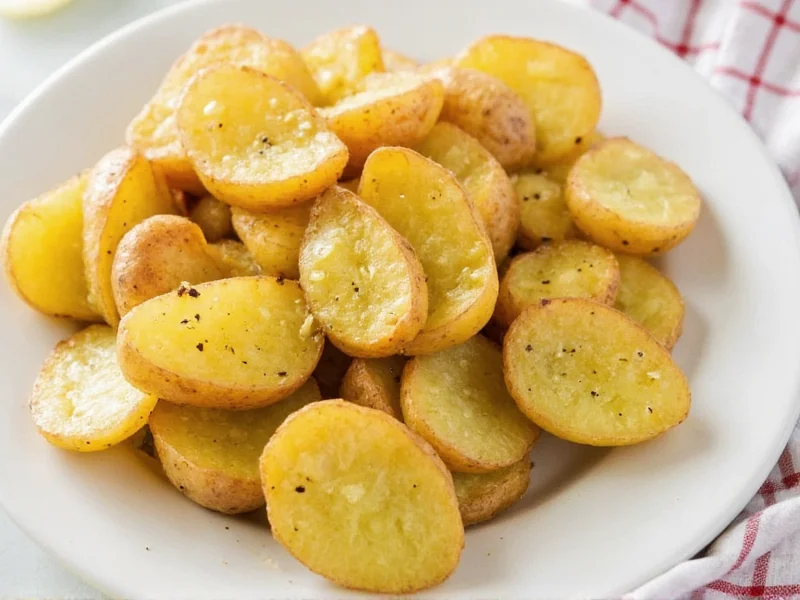Seasoning potatoes properly transforms this humble staple into a culinary highlight. Potatoes serve as a versatile canvas that absorbs flavors while maintaining their distinctive earthy character. Understanding which seasonings complement different potato varieties and cooking methods makes the difference between ordinary and extraordinary dishes. This guide explores scientifically backed flavor pairings and practical seasoning techniques that home cooks can implement immediately.
Why Potatoes Respond Exceptionally to Specific Seasonings
Potatoes contain starches and natural sugars that caramelize during cooking, creating complex flavor compounds. The Maillard reaction - that desirable browning process - works synergistically with certain seasonings. Acidic components like vinegar or lemon zest help balance the starchiness, while umami-rich ingredients enhance the potato's natural savoriness. Understanding these chemical interactions allows you to create perfectly seasoned potatoes every time.
Optimal Seasoning Blends by Cooking Method
Different cooking techniques extract varying flavor profiles from potatoes, requiring tailored seasoning approaches. Here's what works best for each preparation style:
| Cooking Method | Recommended Seasonings | Application Timing | Proportions (per pound) |
|---|---|---|---|
| Roasted | Rosemary, garlic powder, smoked paprika, onion powder | Toss with oil and seasonings before roasting | 1.5 tsp salt, 1 tsp garlic powder, 0.5 tsp rosemary |
| Mashed | Chives, nutmeg, black pepper, fresh thyme | Mix into finished mash | 1 tsp salt, 0.25 tsp nutmeg, 2 tbsp fresh chives |
| Fried | Cayenne, smoked salt, garlic powder, parsley | Immediately after frying while hot | 1 tsp smoked salt, 0.5 tsp cayenne, 1 tsp garlic powder |
| Boiled | Dill, lemon zest, white pepper, tarragon | Add to water or toss after draining | 1.5 tsp salt, zest of 1 lemon, 1 tbsp fresh dill |
| Grilled | Cumin, coriander, oregano, chili powder | Before placing on grill | 1 tsp salt, 1 tsp cumin, 0.5 tsp chili powder |
Scientific Flavor Pairing Principles for Potatoes
Food science reveals why certain seasonings work exceptionally well with potatoes. Potatoes contain glutamic acid, which creates natural umami - this explains why ingredients like Parmesan cheese, nutritional yeast, and mushrooms enhance potato dishes. The starch structure also absorbs fat-soluble compounds more effectively than water-soluble ones, making oil-based seasoning applications more efficient.
Research from the Journal of Food Science shows that combining multiple seasoning elements creates layered flavor experiences. The optimal approach uses:
- Salt - enhances natural flavors and modifies texture
- Aromatics (garlic, onion, herbs) - provide top notes
- Acid (lemon, vinegar) - brightens heavy starches
- Heat (cayenne, black pepper) - adds dimension
- Umami boosters (Parmesan, mushrooms) - deepen flavor profile
Avoiding Common Potato Seasoning Mistakes
Even experienced cooks make these seasoning errors with potatoes:
- Seasoning too early with salt when boiling - causes potatoes to break down; add salt after boiling begins
- Using dried herbs on roasted potatoes - they burn easily; use fresh herbs added during the last 10 minutes
- Overpowering with strong spices - potatoes have subtle flavor; balance is key
- Seasoning only the surface - for mashed or boiled potatoes, season throughout
- Adding acid too early - prevents proper browning; add lemon or vinegar at the end
Specialized Seasoning Blends for Dietary Preferences
Tailor your potato seasonings to accommodate various dietary needs without sacrificing flavor:
- Low-sodium options: Use potassium-based salt substitutes with lemon zest, garlic, and herb blends
- Vegan preparations: Nutritional yeast creates cheesy flavor without dairy
- Gluten-free considerations: Ensure spice blends don't contain wheat fillers
- Keto-friendly seasonings: Focus on herbs, garlic, and healthy fats like olive oil
Creating Signature Potato Seasoning Blends
Develop your own restaurant-quality seasoning mixes with these professional combinations:
- Mediterranean Blend: 2 parts dried oregano, 1 part lemon zest, 1 part garlic powder, 0.5 parts red pepper flakes
- Smoky Southwest Mix: 2 parts smoked paprika, 1 part cumin, 1 part onion powder, 0.5 parts chipotle powder
- French Herb Combination: Equal parts dried thyme, rosemary, tarragon, and chives
- Truffle Infusion: 1 part truffle salt, 2 parts garlic powder, 1 part black pepper (add truffle oil when serving)
Store homemade blends in airtight containers away from light for maximum freshness. Properly stored, most seasoning mixes maintain potency for 3-6 months.
Final Recommendations for Perfectly Seasoned Potatoes
The secret to exceptional potato seasoning lies in understanding both the science of flavor pairing and the practical application techniques. Always taste as you go, remembering that potatoes absorb seasoning gradually. For most preparations, under-seasoning is preferable to over-seasoning - you can always add more, but you can't remove excess salt.
Consider your audience's preferences and the overall meal context when selecting seasonings. A simple salt and pepper preparation often outperforms complex blends when potatoes serve as a supporting element in a meal. When potatoes take center stage, invest time in developing layered seasoning profiles that showcase their versatility.











 浙公网安备
33010002000092号
浙公网安备
33010002000092号 浙B2-20120091-4
浙B2-20120091-4